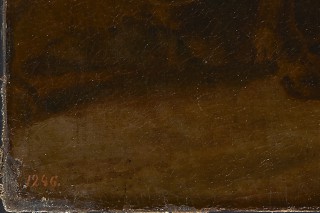Hercules and Achelous
- Date
- 1715-1730
- Object type
- painting
- Technique
- oil
- Material
- canvas
- Dimensions
- 104,9 x 137,1 cm
- Acquisition date
- 1783
- Location
- The Palace on the Isle - Picture Gallery, ground floor
- Marks and inscriptions
- red number 1246 of the Stanisław August collection, bottom left; traces of this same number bottom right
- Place of Origin
- Paris (France)
- Owner
- National Museum in Warsaw
- Acquisition name
- deposit; inv. no. M.Ob.1304
- Museum number
- Dep 931
Since the 18th century, the painting has been considered a pendant to Juno Asking Aeolus to Release the Winds (cat. no. 22). ... They formed a complete set of mythological subjects with two other paintings of similar dimensions, listed as numbers 1244 and 1245 (Rape of Proserpina and Venus and Neptune; sold in 1819, current whereabouts unknown).
...
The painting illustrates an episode from Ovid’s Metamorphoses (IX, 32–63): the battle of Hercules and Achelous, the god of rivers in Calydonia, who competed with the hero for the hand of Deianeira. The 1783 and 1784–92 catalogues of the Stanisław August collection did not give the full title of the Hercules painting, it was recorded as Combat de Hercule contre..., as if there were some uncertainty regarding the hero’s opponent. It is only in the 1793 version that the name Achelous appears. In 19th and 20th-century publications the painting also appears under different titles: Hercules Fighting Achilles (1839), Hercules Fighting a Giant (1851), Hercules Fighting a Titan (1886), and Hercules Killing Cacus (1895 and 1967).
The reason for the differences in the titles was most certainly because the scenes depicting the battle between Hercules and Achelous or/and Cacus—very popular in art—were usually rendered in an identical manner. In the Łazienki version the artist enhanced the composition with figures of two satyrs and the winged Nike. The kneeling figure of the woman on the right is most probably Deianeira observing the battle between her lovers. [See D. Juszczak, H. Małachowicz, The Stanisław August Collection of Paintings at the Royal Łazienki. Catalogue, Royal Łazienki Museum, Warsaw 2016, no. 20, pp.105–107.]



